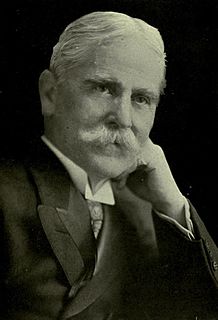A Quote by George Horace Lorimer
Every fellow is really two men -- what he is and what he might be; and you're never absolutely sure which you're going to bury till he's dead.
Related Quotes
You never enjoy the world aright, till the Sea itself flowers in your veins,
till you are clothed with the heavens, and crowned with the stars: and
perceive yourself to be the sole heir of the whole world, and more than
so, because men and women are in it who are every one sole heirs as well
as you. Till you can sing and rejoice and delight, as misers do in gold, and
kings in scepters, you never enjoy the world.
As far as my experience goes, men of genius are fairly gifted with the social qualities; and in this age, there appears to be a fellow-feeling among them, which had not heretofore been developed. As men, they ask nothing better than to be on equal terms with their fellow-men; and as authors, they have thrown aside their proverbial jealousy, and acknowledge a generous brotherhood.



































